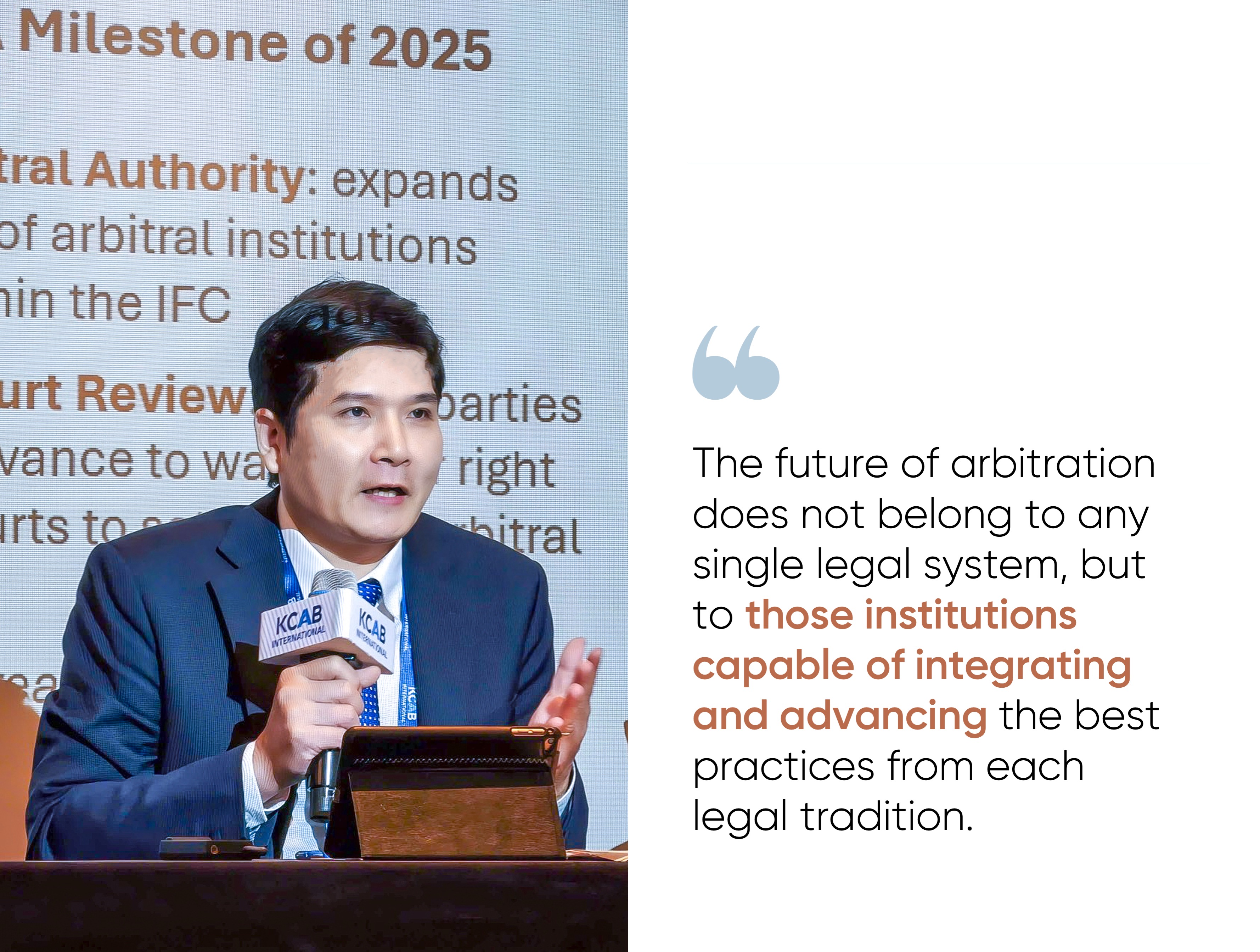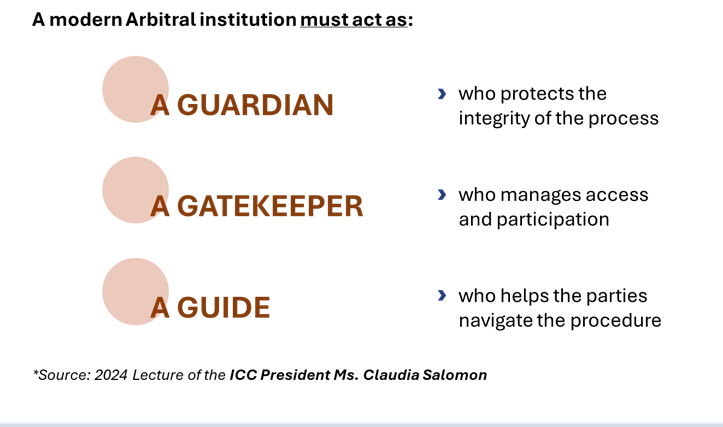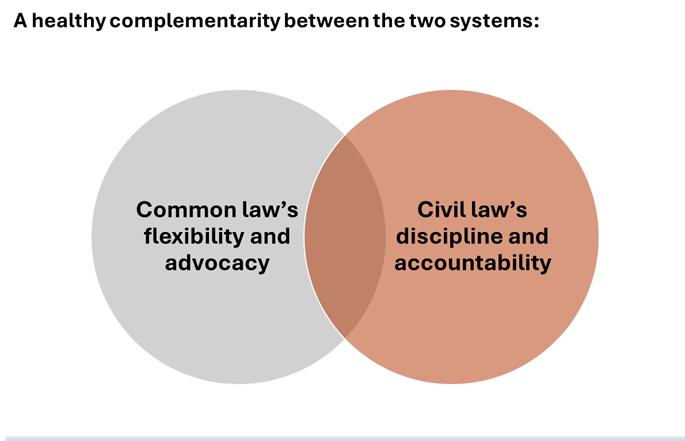On 28th October 2025, Mr. Vu Anh Duong, Permanent Vice President cum Secretary General of VIAC, shared his perspective at the Asia Civil law Summit, held as a part of events series under the Seoul ADR Festival – SAF 2025. Organized by the Korean Commercial Arbitration Board (KCAB), the event brought together a large number of experts from leading law firms, corporations, arbitration institutions, and mediation organizations across the region and around the world.

Mr. Duong highlighted several significant reforms of Vietnam’s arbitration landscape, notably the recent legislative development on arbitrability, arbitration under the Vietnam International Financial Centre framework, and the restructuring of national court system. He also emphasized VIAC’s efforts in reforming and reaffirmed that the future of arbitration lies in cooperation and in institutions that combine the best practices of both common law and civil law traditions to build a balanced and sustainable system.
Key developments of Vietnam Arbitration Jurisdiction
Under Article 2 of the Law on Commercial Arbitration 2010, the scope of arbitral matters in Vietnam was already extensive. However, recent legislative developments and court interpretations have further broadened this scope, affirming that arbitration may now be applied to areas previously considered as non-arbitrale, such as labour-related contracts (Non - Disclosure Agreements (NDAs) and Non – Compete Agreements (NCAs)), real estate and land-use rights (specifically for Vietnamese arbitral institutions), and e-commerce transactions, among others. As a result, the number of disputes in the above-mentioned fields resolved at VIAC has tended to increase in recent times, particularly disputes in the real estate sector, with 190 cases recorded over the past two years.
These developments reflect a growing confidence within the Vietnamese legal system that arbitration serves as a credible, fair, and efficient mechanism for resolving commercial disputes.
A milestone development comes with the new establishment of the Vietnam International Financial Centre (IFC) framework in 2025.
This framework introduces a bold innovation. It will allow parties, by mutual agreement, to waive their right to challenge arbitral awards in court. This reform promotes finality and efficiency of arbitration. While this mechanism will initially apply within the IFC framework, it is expected to become a key consideration in forthcoming amendments to Vietnam’s Arbitration Law. We are eager to observe how this innovative approach will work in practice.
Another notable institutional reform in Vietnam concerns the jurisdictional restructuring of the national court system in relation to arbitration.
Previously, all provincial-level courts were vested with authority to handle arbitration-related matters, a structure that often resulted in inconsistent interpretations and decisions. Under the recent judicial reform, this authority has been centralized and streamlined, with only three designated provincial courts – located in Hanoi, Ho Chi Minh City, and Da Nang – have the authority to supervise and handle request to set aside domestic arbitral awards (Resolution No.81/2025/UBTVQH15, effective from 1 July 2025). Meanwhile, lower-level courts remain responsible for providing judicial assistance in arbitration proceedings, including matters such as interim relief, witness summons etc. This specialization represents a significant step toward enhancing consistency, predictability, and professionalism in the judiciary’s supervision of arbitration, ensuring more coherent and arbitration-friendly judicial practice across the country.
In addition, Vietnam’s new policy resolutions reaffirm the State’s pro-arbitration stance and its determination to develop a modern, credible legal environment that embraces arbitration and other alternative dispute resolution mechanisms. These reforms are part of broader efforts to promote private sector growth, strengthen investor confidence, and align Vietnam’s dispute resolution framework with international best practices.
Taken together, all these reforms reflect Vietnam’s determination to build a modern, credible, and pro-arbitration legal environment.
Adapting with the change in expectations for dispute resolution
Beyond legislative reform, civil-law-influenced practice are adapting to meet changing expectations and contributes to international practice.
Quoting Ms. Claudia Salomon, President of the International Chamber of Commerce (ICC), in her lecture last year, a modern arbitral institution must act as a Guardian, a Gatekeeper and a Guide.

This philosophy resonates strongly with the civil law tradition, in which both the institution and the arbitral tribunal share responsibility for ensuring due process and procedural justice, rather than leaving the conduct of proceedings entirely to the parties.
At the same time, the interaction between the common law and civil law systems has fostered a healthy complementarity – where the flexibility and advocacy strengths of the common law merge with the procedural discipline and institutional accountability of the civil law – creating a more balanced and sustainable model for international arbitration.

In addition, the ongoing wave of digital transformation in arbitration has been largely institution-led, a hallmark of civil law jurisdictions where progress is driven primarily by state and judicial institutions rather than market forces. This trend, often described as the “Go East” movement, has seen leading civil-law arbitral centres spearhead the adoption of AI-assisted case management systems and the development of professionalized Secretariats capable of managing timelines, supporting tribunals, and safeguarding due process.
This approach reflects a model of structured efficiency, where technology is integrated not as a substitute for institutional authority but as a tool to enhance both speed and procedural quality.
Building on this philosophy of adaptation, Mr. Duong also highlighted VIAC’s digital transformation journey as a key illustration of how civil-law-based arbitral institutions are modernizing to meet international expectations.
In June 2024, VIAC launched the VIAC.eCase Platform, a system with numerous improvements aiming at making the arbitration proceeding more convenient and flexible, saving time and cost for the parties while enhancing the efficiency of arbitration as a method promoting cross-border trade and investment activities. Through this platform, parties are able to file cases electronically, upload documents in a secure environment, and receive automated scheduling updates and procedural notifications. The system significantly reduces administrative burdens, resulting in greater time and cost efficiency, while simultaneously enhancing transparency and reinforcing due process throughout the arbitral proceedings.
This aligns with the civil-law tradition, where digital transformation is typically driven not only by market competition but also by institutional reform and public policy, ensuring coherence and long-term sustainability rather than fragmented or ad hoc modernization.
In parallel, VIAC is in the process of finalizing a comprehensive revision of its Arbitration Rules, which is expected to be released in early 2026. The forthcoming amendments to VIAC’s Arbitration Rules are designed to further modernize and strengthen the institution’s procedural framework.
Specifically, these updates aim to enhance transparency and fairness in the appointment of arbitral tribunals, establish clear and comprehensive procedures for virtual hearings and expedited proceedings, and integrate digital tools and artificial intelligence to make case management more efficient and intelligent. Collectively, these reforms will enable VIAC to align more closely with international best practices, while reinforcing user confidence in the institution’s role as a trusted and forward-looking civil-law-based arbitral centre within the global arbitration community.
Cooperation Over Competition
In conclusion, cooperation, rather than competition, stands as the key to the sustainable development of international arbitration. As arbitration markets become increasingly interconnected, civil-law-based institutions are encouraged to collaborate through the exchange of best practices, joint training initiatives for arbitrators, and collective efforts to dispel misconceptions surrounding civil-law traditions. Such collaboration reaffirms that these institutions are not merely relevant but constitute essential pillars within today’s global arbitration ecosystem.
Ultimately, the future of arbitration will not rest upon any single legal culture but upon those institutions capable of integrating the discipline of structure with the openness of innovation, harmonizing the strengths of both the common law and civil law traditions to foster a more balanced and sustainable system of dispute resolution.